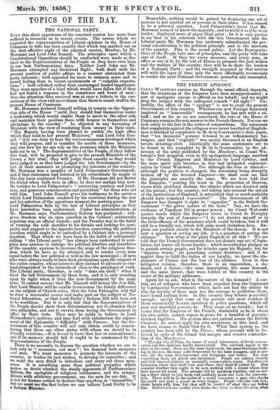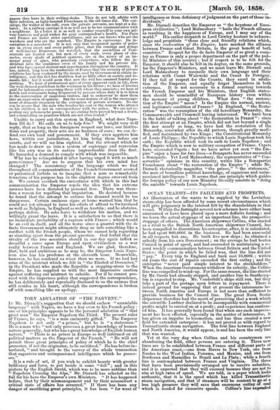THE FRENCH APOLOGY.
COUNT WALEWSKI assures us, through the usual official channels, that the intentions of the Emperor have been misapprehended; a sort of apologetic excuse is offered on his behalf ; and we might drop the subject with the colloquial remark " All right ! " Un- luckily, the effect of the " apology" is not to exalt the present Government of this country. Whereas our new Foreign Secretary implored an " honourable" arrangement, he has met with a re- buff-; and so far as we are concerned, the vote of the House of Commons remains the sole answer to the French threats. Nor can we look solel to the last in the series of compositions. The assurance ai that complaints against the refugees were never levelled at English- men is f ' ' n ed. by complaints in M. de la Guerroniere's state paper, that "ten thousand' persons listened to an inflammatory ha- rangue, and that " regicide " was openly discussed in an English tavern debating-club. Identically the same sentiments are to be found in the pamphlet by M. de la. Guerroniere, in the ad- dresses of the army published by the Noniteur, in Count Wa- lewski's first despatch, even in the apologetical language ascribed to the French Emperor and Ministers by Lord Cowley, and the same spirit still breathes in this last mitigated communi- cation by Count Waleweki. For although the tone is altered— although the position is changed, the discussion being abruptly broken off by the worsted Emperor—we shall soon see that the principles are exactly the same. We are here told that the Emperor, " putting his trust in the protection of Heaven, views with profound disdain the attacks which are directed only at his person; but the country, not taking into account the nature of the institutions of England, is astonished that so much audacity should have remained unpunished." The Government of the Emperor has thought it right to " signalize" to the British Go- vernment " the grave nature of the facts." Nay, we have the evidence of Napoleon III in proper person ; for Count Walewski quotes words which the Emperor wrote to Count de Persigny towards the end of January—" I do not deceive myself as to the little efficacy of the measures which could be taken, but it will still be a friendly act, which will calm much irritation here. Ex- plain our position clearly to the Ministers of the Queen. It is not now a question of saving my life, it is a question of saving the alliance." Now what is the plain English of all this ? We are told that the French Government does not dictate any act of legis- lation, but leaves all to our loyalty ; which nevertheless pledges us to punish certain people, not for attacks upon his Majesty, but for "impious words," for preaching certain doctrines : and if we neglect thus to fulfil the duties of our loyalty, we incur the dis- pleasure of France and the loss of the alliance. Even in this mitigated version, therefore, there is an imputation, a de- mand, and a threat,—the same imputation, the same demand, and the same threat, that were hurled at this country in the worst of the military addresses. Again let us ask, what is the nature of the demand? A cer- tain set of refugees who have been expelled from the Continent by Continental Governments which have not had the ability to win the loyalty of those men nor the courage to guillotine them, have found asylum here. In. this country they behave peaceably enough ; except that some of the poorest and most reckless of them occasionally become involved in police questions, which all poor and wretched persons do. They cause us no trouble ; but it seems that the Emperor of the French, disdainful as he is about his own safety, cannot repose in peace for a handful of poverty- stricken fugitives. His system does not extend across the British Channel ; he cannot apply his own machinery in this land, and we have reason to thank God for it. What that system is, the country has been told by the Times ; whose account will be be- lieved in spite of the formal but meagre and evasive contradic- tion of the Moniteur- " The gay city of Paris, the home of social intercourse, of lively conver- sation and free opinions, hardly knows itself. The outward aspect of the place is the same; there are the same boulevards, the same fountains flash- ing in the sun, the same cafés frequented by the same loungers, and in pri- vate life the same drawingrooms, and hangings, and toilets. But over everything there are gloom and uneasiness. People are talking timidly and with unusual dulness on unusually commonplace topics. Families are hesitating whom they shall visit and'whom they shall be visited by. Kea consider whether they ought to be seen walking with a friend whom they have known for years. Two persona will.be speaking together, and on see- ing a third about to join them will suddenly pause and turn the oonversa- tion. There will be in the midst of a social concourse a man who checks the mirth and puts a guard on every tongue. People will talk with him, shake hands with him, but they will be careful of what they say before him. Individuals are careful what books,they have in their libraries, what papers they have in their writing-desks. They do not talk affably with their inferiors, as light-hearted Frenchmen in the old times did. The con- cierge, the waiter at the café, even the private servants, are kept at a dis- tance. In a railway carriage it is as well not to be too communicative with a neighbour. In a letter it is as well to confine yourself to your own pri- vate business and good wishes for your correspondent's health. For Paris and France are under strict surveillance, and no one knows who are the watchers and who are the watched. The Empire is espionage. Its in- carnation is a mouchard. It is not only that recognized agents of police are in every street and every public place, that the comings and goings of well-known Democrats are watched, that the assemblies of Coin- =mists are hunted out, but men of every rank, every phase of cha- racter, every shade of political opinions, are at the mercy of an im- mense army of spies, who penetrate everywhere, who follow the in- dividual into the confidence even of his family and his private life, and who have spread distrust and apprehension throughout the country. It has, indeed, long been the misfortune of France that the security of private relations has been weakened by the means used by Government to obtain in- telligence, and this fact has doubtless had no little effect on society and do- mestic life ; but it would seem that now the evil has assumed fearful pro- portions. 'We hear of professional spies of every apparent rank in life, from the well-dressed gentleman to the workman in his blouse ; we hear of lorettes paid for information concerning those with whom they associate ; we hear of hotels and restaurants being frequented by persons whose duty it is to listen to the conversation of suspicious visitors, and to endeavour to draw them into an expression of opinion. But the worst feature of all is the enoourage- ment of domestic treachery by the corruption of private servants. No one can be secure that the man who brushes his coat or the woman who atteithi 'on his children is not in correspondence with the police. We are not re- peating any gobemouche gossip ; we are stating facts proved beyond a doubt, and commenting on practices which are not even denied."
Unable to carry out this system in England, what does Napo- leon III do ? He calls on us to help him ! We might very well reply, that so long as the foreigners respect our laws, our institu- tions and property, their acts are no business of ours ; we can de- fend our own land and government. If they even aggrieve him here, within our jurisdiction, let him bring them before our courts, and we will see him righted. But the attempt which he has made to draw us into a system of espionage and repression like his own was in its nature impracticable from the first. He hazarded a demand to comply with which was impossible. Why has he relinquished it after having urged it with so much perseverance ? Are we to suppose that his own mind has changed ? The consistency of the language which we find throughout all communications of the French Government avowed or patronized forbids us to imagine that a man so remarkably tenacious of his purpose has in the slightest degree swerved from it. We cannot overlook the earnestness with which in this last communication the Emperor repels the idea that his extreme courses have been dictated by personal fees. There was there- fore a reason for repelling that imputation. He desisted because he found that the attempt to enforce his demand would be too dangerous. Certain ominous signs at home warned him that he could not yet attempt to issue his edicts of affront to Switzerland as well as Belgium, to England as well as Austria ; and he abstains, perhaps defers. Me asks leave to withdraw his -motion, and we willingly grant the leave. It is a satisfaction to us that there is no immediate probability of a rupture with France ; which would be an evil in itself, and all the worse since a quarrel with the de facto Government might ultimately drag us into something like a conflict with the French people, whom we cannot help regarding as standing apart from the present question. God forbid that the rivalry of the two countries should in our day again inflict so dreadful a curse upon Europe and upon civilization as a war really between France and England. We are glad, therefore, that, bold and ambitious as he may be, the Emperor Louis Napo- leon also has his prudence at the eleventh hour. Meanwhile, however, he has rendered us wiser than we were. If we had lost some of the mistrust which we felt in " the Elected of December," in the President who made the Republic a stepping-stone to the Empire, he has supplied us with the most impressive caution against suffering our mistrust to subside. For if he cannot pro- ceed with the imperious policy that suggested the correspondence, he has deliberately and repeatedly disclosed to us the animus that still resides in his heart, although the correspondence is broken off with something like an apology.



























 Previous page
Previous page